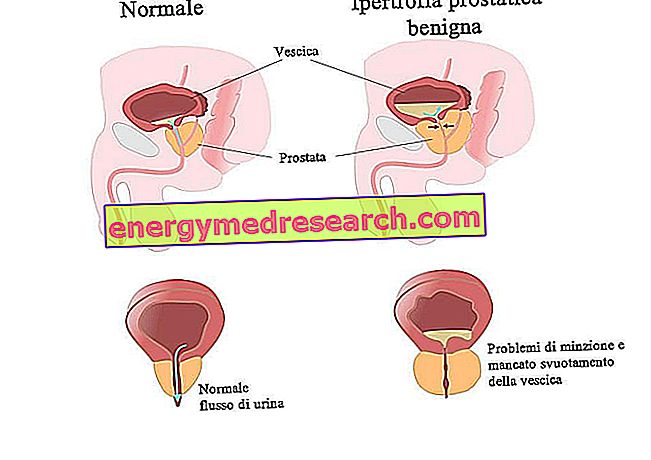Generality
Ménière's syndrome is an inner ear disease, responsible for temporary but repetitive episodes of vertigo, nausea and hearing loss.

Unfortunately, there is no specific treatment for Ménière's syndrome, but a series of valid therapeutic interventions can be used to improve the quality of life of patients.
Structure of the inner ear
The inner ear is mainly composed of two structures:
- The cochlea (or snail ), that is the organ of hearing
- The vestibular apparatus (or system ), that is the organ of balance

Both of these organs are connected to the brain via two nerves: the cochlear nerve for the cochlea and the vestibular nerve for the vestibular apparatus.
The vestibular apparatus has a structure composed of semicircular canals, which takes the name of labyrinth . The endolymph is contained in the labyrinth and the cochlea. The latter is fundamental for auditory perception and for balance, as it allows the transmission of the nervous signal.
What is Ménière's syndrome
Ménière's syndrome is a disease that afflicts the inner ear . It is characterized by the accumulation of endolymph inside the labyrinth and the consequent alteration of the nerve signal between the ear and the brain. The main consequences are: hearing loss, dizziness, lack of balance and perception of "noises" or "whistles" in the ear (tinnitus).
EPIDEMIOLOGY OF THE SYNDROME OF MéNIèRE
The incidence in the population is 1 case per 1, 000 individuals. Ménière's syndrome can affect anyone and arise at any age, but the most affected subjects are males between 40 and 60 years old.
In 80-90% of cases, the symptoms of the disease affect only one ear (unilateral syndrome). When both ears are involved (bilateral syndrome), the symptoms appear in the second ear after 2 or 3 years, compared to the first.
Causes
The exact cause of Ménière's syndrome is currently unknown and several factors are suspected. However, anatomical examinations of the inner ear of patients show a common characteristic:
- The accumulation of endolymph inside the vestibular apparatus and the cochlea
PATHOLOGICAL ANATOMY
The accumulation of endolymph, also called hydrops, determines a dilation of the structures that contain it: labyrinth and cochlea. These changes cause:
- Damage to the cells that make up the labyrinth epithelium and cochlea
- An increase in internal pressure
- An alteration of nerve signal transmission between the inner ear and the brain
The thesis that it is precisely the idrope that triggers Ménière's syndrome is supported by a couple of important observations.

Figure: situation that is generated inside the vestibular apparatus, when the endolymph is accumulated. In fact, one can note the dilation of one of the semicircular canals.
The first: the accumulation of endolymph is an episodic and transient phenomenon, at the end of which the normal auditory and balance perception is restored. For example, when the pressure returns to normal levels, the patient no longer feels symptoms.
The second: the succession of accumulations of endolymph inside the labyrinth and cochlea, over the years, gradually worsens the auditory perception, until it is irreparably damaged.
At this point, it is legitimate to ask what are the factors that induce hydrops.
RISK FACTORS OF THE SYNDROME OF MéNIèRE
Suspicions fall on several factors. Here are what they are:
- Genetic predisposition.
- Immune system abnormalities, such as Cogan's syndrome, rheumatoid arthritis and erythematous systemic lupus.
- Viral infections.
- Syphilis.
- Vascular factors. In patients with migraine, an association was observed between the latter and Ménière's syndrome.
- Partial ossification of the vestibular canal channels. This causes a deformation of the labyrinth of the inner ear, which causes the accumulation, in some locations, of the endolymph.
- Altered ionic / saline content of the endolymph. The balance of certain salts and ions is essential for the correct transmission of the nerve signal, which travels from the ear to the brain. When the saline composition of the endolymph is changed, this communication is altered.
Symptoms
To learn more: Symptoms Ménière syndrome
The main symptoms of Ménière's syndrome are the following:
- Hearing loss, ie hearing loss from the affected ear
- Vertigo, which causes lack of balance
- Nausea and vomiting, followed by cold sweating and arterial hypotension
- Tinnitus, that is "whistling" in the ear
- Sensation of ear closure ("closed ear" or fullness of the ear)
Less common symptoms are nystagmus and sudden fainting without loss of consciousness.
INITIAL PHASE OF Ménière Syndrome
At an early stage of the disease, these symptoms manifest themselves as transient and episodic attacks, which can last from 20 minutes to several hours, generally no more than 3 or 4. They often have an acute and sudden onset and usually affect a ear only.
It is very common for the patient to be subjected to close attacks over time, which can last a couple of days or even a week. After these manifestations, a period of remission follows, interrupted by another series of attacks. On average, an individual with Ménière's syndrome at the initial state manifests, in a year, from 6 to 11 such "crises".
Dizziness can occur without being accompanied by hearing loss; while, the nystagmus, when it appears, is usually of short duration. But the opposite can also occur. Therefore, it is difficult to accurately establish the symptomatology, since the latter varies from patient to patient.
ADVANCED PHASE of Ménière's Syndrome
When Ménière's syndrome is at an advanced stage, some symptoms begin to assume a permanent character . This is the case with hearing loss, for example. In fact, a patient subjected to repeated attacks over the years develops an irreversible damage to the structures that make up the labyrinth and the cochlea. Evolution, in some cases, is so severe that it can lead to complete deafness of the affected ear.
Although it is less common, even the sensation of "whistling" in the ear, or tinnitus, can become a permanent symptom. While, as regards the lack of balance, this too can become a stable condition, although vertigo is less frequent.
The following table summarizes the characteristics of the main symptoms of Ménière's syndrome, in its early and advanced stages.
| Ménière syndrome | |
| Initial phase | Advanced stage |
| Sudden dizziness, lasting up to a few hours | Dizziness less frequent |
| Lack of temporary balance | Lack of lasting balance |
| Nausea and vomit | Nausea and vomit |
| Temporary hearing loss in one ear | Permanent loss (until deafness) of the hearing ability of the affected ear. Involvement of the other ear |
| Temporary tinnitus | Permanent tinnitus |
| Short duration nystagmus. it is rare that it is prolonged over time | Long lasting nystagmus |
ABSENCE OF SIGNS
Premise: in medicine, an objective finding, recognized by the doctor in a patient, is considered a sign. The symptom, on the other hand, is a subjective sensation reported by the patient, such as vertigo.
Ménière's syndrome has no distinctive diagnostic signs. This complicates the diagnosis, as will be seen later.
COMPLICATIONS
The main complications of Ménière's syndrome are those, in part already mentioned, of the advanced stage of the disease:
- Complete deafness of the affected ear
- Healthy ear involvement after 2-3 years
- Depression and anxiety, due to poor quality of life, causes repeated attacks of nausea and vomiting
Diagnosis
To establish with certainty the diagnosis of Ménière's syndrome, the following are required:
- Differential diagnosis
- Analysis of clinical symptoms
- Audiometric investigations
Their need depends on the fact that the disease is characterized only by non-specific symptoms (hypoacusis, tinnitus, vertigo etc.), which also arise in other pathological circumstances. Therefore, a simple audiometric examination, for example, is not sufficient to confirm the suspicions.
DIFFERENTIAL DIAGNOSIS
A detailed differential diagnosis is of great help to rule out pathologies similar to Ménière's syndrome or which cause the same symptoms.
The main investigations, therefore, are aimed at excluding an acoustic neuroma, a transient ischemic attack (TIA), abnormalities of the labyrinth arteries, toxic effects of some drugs on the vestibular apparatus, migraine, cervical spondylosis or some systemic diseases (anemia, syphilis etc).
These morbid circumstances very often cause only one of the typical symptoms of Ménière's syndrome. The tests to undergo are different; among these, the most practiced are:
- Blood tests
- Nuclear magnetic resonance
- electrocochleography
The following table summarizes the pathological conditions that can be confused for Ménière's syndrome.
| Differential diagnosis | |
| diseases | Description |
| Neurinoma of the auditory nerve |
|
| Abnormalities of auditory arteries |
|
| Other intracranial tumors | |
| Migraine |
|
| Cervical spondylosis | |
| Otitis middle ear | |
| Toxic drugs |
|
| Arterial hypotension |
|
| Systemic diseases |
|
ANALYSIS OF CLINICAL SYMPTOMS
Some diagnostic criteria have been established concerning vertigo and tinnitus.
The feeling of vertigo must last at least 20 minutes and must not be a sporadic and isolated episode. In other words, it must be followed by at least another vertiginous crisis. Only in this case is there a typical Ménière syndrome attack.
Furthermore, Romberg's test is useful for assessing the patient's coordination and balance. Tinnitus, on the other hand, must be associated with the so-called "closed ear", or fullness auricular .
AUDIOMETRIC TESTS
Finally, audiometric tests are used to assess the real hearing ability of the patient, who complains of partial or complete deafness. The tests put in place are the Rinne test and the Weber test .
Therapy
There is no specific therapy for Ménière's syndrome. However, certain symptoms of the disease can be alleviated.
Treatment and prevention of attacks of vertigo and nausea are among the most adopted therapeutic procedures. They are in fact indispensable for improving the quality of life of patients.
If these treatments are not sufficient, the patient can undergo some surgical procedures.
The treatments for hearing loss, for tinnitus and for balance disorders should not be forgotten. They aim to recover, at least in part, the auditory and postural capacity.
Finally, as in many other pathologies, a healthy lifestyle helps prevent the worsening of Ménière's syndrome. Practicing physical activity and eating properly are two fundamental elements to mitigate Ménière's syndrome.
TREATMENT OF VERTIGINE AND NAUSEA
For the treatment of dizziness, nausea and vomiting, it is advisable to take anti-emetic and antivertigenous drugs, such as:
- prochlorperazine
- Cinnarizine
- cyclizine
- Promethazine
Their action is expressed at the nervous level, on the message sent from the ear to the brain. The ideal time to take these drugs is at the first signs of an attack of vertigo and nausea.
If no action is taken promptly, the patient may expel the tablet taken with vomiting. To avoid this inconvenience, the same medicines exist in soluble or injected form, as well as chewing gum and suppositories.
Another possible drug treatment is based on steroids.
PREVENTION OF VERTIGINE AND NAUSEA
The drugs to prevent attacks of vertigo and nausea are:
- Betahistine . It has a positive effect in reducing the number and severity of vertigo and nausea crises.
- Gentamicin . A transtimpanic injection of this medicine is performed, which at this level acts on the nervous signal that regulates the balance.
- Diuretics and beta-blockers . They serve to decrease the pressure inside the vestibular apparatus. Pressure that is high due to endolymph accumulation.
Deepening: Medicines for the Treatment of Ménière Syndrome »
SURGERY
When previous drug treatments do not produce any results, surgery is used. There are four surgical procedures to which a patient with Ménière's syndrome may undergo.
| Surgery | What's this? |
| labyrinthectomy | It is the removal of the labyrinth of the inner ear affected by the disease |
| Decompression of the endolymphatic sac | It serves to reduce the pressure of the endolymph inside the labyrinth |
| Section of the vestibular nerve | The nerve of balance is "cut". In this way the abnormal nerve signal between the inner ear and the brain is interrupted |
| Micropressure therapy | By means of a special instrument, pressure pulses are sent which make the endolymph flow from the sites where it has accumulated. Aims to lower the high pressure |
The first three interventions are highly invasive, while the last one, micropressure therapy, is only moderately invasive.
HEARING RECOVERY, ACUFENI CARE AND PHYSIOTHERAPY CARE
For hearing loss (permanent or transient), you can use hearing aids . These tools serve to increase the patient's ability to perceive sounds.
For tinnitus, that is the "whistle" in the ear, so-called sound therapy is used. This consists of distracting and relaxing the patient by listening to music. It seems that, in this way, the sensation of tinnitus is successfully reduced. There are also specific medications for the treatment of ringing in the ears.
To regain normal balance and correct coordination, it is useful to consult a physiotherapy specialist.
OTHER PREVENTIVE MEASURES
As mentioned above, a healthy lifestyle helps, as always, to prevent and improve the symptoms of Ménière's syndrome. The main recommendations are:
- Low-salt diet, to keep the pressure of body fluids low, including endolymph.
- Not smoking
- Don't abuse alcohol and caffeine
- Regular exercise, to distract the patient and keep him active. In fact, those who are subject to vertigo and nausea tend to lie down and not perform motor activities.
Prognosis
Patients, as we have seen, do not all show the same clinical picture. In fact, the symptoms vary from case to case. It is therefore difficult to establish a prognosis for Ménière's syndrome.
In light of this premise, some considerations are appropriate.
Although there is no specific treatment, most patients (around 80%) improve their health condition without resorting to invasive surgery. However, being subjected to periodic attacks of nausea, vomiting and hearing loss negatively affects the quality of life. The situation worsens if hearing loss is permanent (deafness).
Furthermore, some inconveniences related to sudden attacks of vertigo should not be overlooked. One of these, for example, is driving a vehicle. Upon the onset of a vertigo attack, the affected individual can lose control of the vehicle he is currently driving. In this regard, in many countries, there is a special regulation for the granting of the license to those suffering from Ménière's syndrome.



